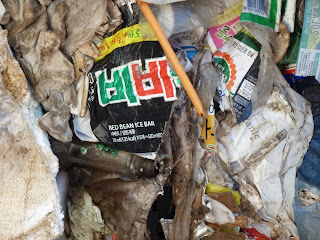Environmentalists Shoot Down Bill that Will Lift Ban on Incineration
Quezon City.
Some 100 advocates for environmental health and climate justice gathered in
front of Batasang Pambansa to denounce a legislative measure, which, if
enacted, will lift the landmark waste incineration ban under R.A. 8749, or the
Clean Air Act.
Led by the EcoWaste Coalition and other pro-Zero Waste groups, the protestors slammed House Bill 3161 introduced by Caloocan 2nd District Rep. Edgar Erice that seeks to amend Section 20 of the Clean Air Act to allow the use of incinerators to burn municipal, bio-medical and hazardous wastes in light of the country’s garbage problems.
In a position paper submitted to Manila 5th District Rep. Amado Bagatsing, Chair of the House Committee on Ecology, the EcoWaste Coalition asked the Committee not to back HB 3161, which the group described “as a regressive step that can only worsen instead of solving the country’s garbage problems.” Instead, the group urged the Committee to uphold the full implementation of RA 8749 and also RA 9003, or the Ecological Solid Waste Management Act, which also prohibits waste incineration.
“The incineration of waste simply transforms the garbage problem into a formidable air pollution problem which would be more difficult and costlier to deal with,” said Aileen Lucero, National Coordinator of the EcoWaste Coalition.
“The burning of discards will liberate the heavy metals and other toxic substances present in the waste stream. The process of burning chlorinated materials, including some plastics, also creates super toxic substances, including proven carcinogens like dioxins and furans,” she explained.
“We maintain that the DENR does not have the capacity to monitor incinerators for these emissions of concern, so a decision to allow incinerators will only result in a more insidious pollution problem that will be difficult to address,” she emphasized.
Anne Larracas of the Global Alliance for Incinerator Alternatives noted that “studies show that burning recyclable or reusable resources initiates a climate-changing cycle of new resources drawn out of the Earth, processed in factories, shipped and used around the world, and then wasted in incinerators and landfills.”
“Incineration of wastes will still create a need for landfills as the process of incineration produces toxic ash and air particulates that will still need appropriate area for storage and hence, instead of limiting the aggregation of wastes, the proposed bill will create more toxic wastes that are harder to manage,” Larracas explained.
Merci Ferrer, Director of Health Care Without Harm Asia, added that “burning or incineration of bio-medical waste, by its nature, produces harmful pollutants, with dioxins and furans among the most harmful of the lot.”
“To incinerate bio-medical waste and at the same time meet the regulatory standards set by the Clean Air Act would be very costly and, by its impracticability, would render incineration a non-solution,” Ferrer added.
“Given the availability of alternative non-burn technologies with proven environmentally responsible track records, there is no need for the country to retrogress to incinerating bio-medical waste,” she added.
For her part, Atty. Gloria Estenzo-Ramos, Coordinator of the Philippine Earth Justice Center mentioned that “HB No. 3161 allowing incineration is a shameful act of backsliding and a grave manifestation of the utter lack of the political will of the state agencies to implement our long languishing environmental and climate related laws.”
“R.A. 9003, as presently worded and if only properly implemented, could effectively reduce the volume of waste and change the existing throw‐away mentality. What should be better addressed by amendment are the gaps in the law, such as provisions for disposal of hospital and other hazardous wastes and increased penalty for non‐performing public officials,” Atty. Ramos pointed out.
“We request our Congress to conduct a serious investigation in aid of
legislation why executive agencies tasked to implement our environmental laws
have utterly failed in their mission. Investigation, not incineration, is the
urgent call of the hour,” Atty. Ramos stated.
Among the groups that submitted position papers to the Committee on Ecology were the Cavite Green Coalition, EcoWaste Coalition, Global Alliance for Incinerator Alternatives, Green Convergence for Safe Food, Healthy Environment and Sustainable Economy,Health Care Without Harm, Partnership for Clean Air and the Philippine Earth Justice Center.
Also present to express their objection to the removal of the incineration ban under the R.A. 8749 were the representatives from Buklod Tao, Greenpeace Southeast Asia, Kongreso ng Pagkakaisa ng mga Maralita ng Lungson, Miriam PEACE, November 17 Movement, Zero Waste Recycling Movement of the Philippines Foundation, Zero Waste Philippines and the Zone One Tondo Organization.
Among the groups that submitted position papers to the Committee on Ecology were the Cavite Green Coalition, EcoWaste Coalition, Global Alliance for Incinerator Alternatives, Green Convergence for Safe Food, Healthy Environment and Sustainable Economy,Health Care Without Harm, Partnership for Clean Air and the Philippine Earth Justice Center.
Also present to express their objection to the removal of the incineration ban under the R.A. 8749 were the representatives from Buklod Tao, Greenpeace Southeast Asia, Kongreso ng Pagkakaisa ng mga Maralita ng Lungson, Miriam PEACE, November 17 Movement, Zero Waste Recycling Movement of the Philippines Foundation, Zero Waste Philippines and the Zone One Tondo Organization.
-end-









Comments
I really loved your blog, but it appears that you have put a lot more work into it. I will keep your blog in my twitter so I can come back and see it again when it has some new information. Good subject!
Infectious Waste
thanks,